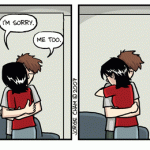“If the only place where I could see you was in my dreams, I’d sleep forever” – anonymous
My first love, who shall remain nameless but with whom I am still a Facebook friend, lived for most of our time together in Blackpool. I lived in the Peak District, Dudley and then north London (don’t ask – it was a disruptive time!) Throughout what was, in spite of everything, a happy period in my life, we saw one another largely on weekends at her place or mine, but otherwise through frequent correspondence in the days before the Internet. At the time, I knew little differently – previously I had dated people for a time, then they had gone off somewhere else and that was an end to it. But distance relationships, including the heartache of separation, came to be the way things were in the real world – falling for someone on your doorstep seemed an impossibility.
It was a lesson I found difficult to forget. Even with my future wife, we spent some while apart while I was in Manchester and she in Hertfordshire, before she took the unilateral decision to move closer to me – and at that point cohabitation and marriage seemed an inevitability, and so it proved.
Twenty-odd years later, after the marriage ended amicably, I managed a real humdinger of a long-distance relationship: something in the region of 5,500 miles, and in spite of everything that relationship continued for a good year, until the distance factor got in the way – she was supposed to come over here but kept making excuses and ultimately decided against. Instead, she moved to Seattle, moved in with a previous boyfriend, and began a relationship that ended in tears. Such is life.
Since then I’ve had relationships with people who did live locally to me, but uncovered another strange truth. Sometimes, you can see more of and be closer to people in long distance relationships. The distance between two people living in the same house can be a million miles, where someone on the other side of the world can be virtually curled up next to you on the sofa. Communication must be close, honest and intimate (in the widest sense of the word) for relationships to work, and they can equally fail if you are like ships that pass in the night and fail to make time to listen to one another.
The Internet has much to answer for, of course. At one time there was little option but to meet people locally, nor were transport links cheap and reliable to make anywhere on earth a hop, skip and a jump away, as it were – and I’m not including the imported bride market, either. Theoretically you have a far wider choice and can select people on the basis of appearance, a common set of interests, attitude to life, sexual appeal and much more besides.
Where once you met people at a dance or evening class or at work or by chance encounters in the pub, now we can and do meet people online – dating that way has become the norm, and the UK its spiritual home. If you try online dating you have the option to choose people within any distance banding that appeals, then the joys of email, texting, telephony, social networking, MSN and Skype mean you can speak and see one another almost as clearly as if they they were in the same room, time differences notwithstanding. And, of course, you have the option of having some sort of remote fun, if time alone is possible, though none of these things will suit everybody, and it’s not the same as true intimacy.
The nature of net meeting tends to accelerate such encounters but also bypasses some of the old-fashioned courtesies of courtship (like dating and waiting til the fourth date or later before sex?) Not seen any statistics but I would anticipate the impact would be to exacerbate the probability of relationships being like fireworks – shooting fast, burning bright, then fizzling out in short measure.
Part of the issue is the nature of that communication, since text or email conveys words that are easy to misinterpret. Face to face communication enables so much more context through body language, eye contact, vocal inflections, the brush of skin against skin, that great old-fashioned pastime of cuddling and kissing – all things you miss out on if your relationship is distant. Meeting face-to-face means you can enjoy true contact, take the vibe and show warmth and empathy like no other form of bonding!
Surely one relevant factor to the success of any relationship is that you do need time apart to do your own things – personal space and avoiding claustrophobia and loss of your own unique personality is surely desirable. Clearly, there is a balance to be struck.
Bear in mind that just as relationships in the flesh can be one-sided and controlling, so too can long-distance relationships. I’ve known one lady who has been in a long-distance relationship with a chap several hundred miles away. He has never once driven down to see her, but every other weekend she drives to stay at his home – despite having once caught him there with another woman. I told her on many occasions she is being abused but she seems happy to continue on this basis, with the promise that they may one day be together permanently. I personally would not tolerate this situation, but then we are all different.
I found this Psychology Today article by Mel Schwartz analysing whether familiarity breeds contempt to be quite insightful in describing how the passage of time can wither relationships even more than physical distance:
Does Familiarity Breed Contempt?
Do you really believe that familiarity creates contempt?Published on October 24, 2010 by Mel Schwartz, L.C.S.W. in A Shift of Mind
The expression “familiarity breeds contempt” is all too familiar. Yet, as the case with many common sayings, we might benefit from taking a look at whether or not it truly makes sense. When we don’t examine these beliefs they tend to become self-fulfilling prophecies. Ordinarily, the expression “familiarity breeds contempt” refers to what often happens in long-standing relationships and marriages. Regrettably, over time too may relationships begin to see their happiness wither. Yet, the question remains: is it actually familiarity that causes this disappointment?
We might consider whether it’s familiarity that’s the culprit or whether something else is provoking the contempt. At times, familiarity may in fact pave the way for greater intimacy and love. After all, when the relationship begins and we open to emotional intimacy, we set the stage for falling in love. If a soft kiss, an appreciative hug or the simple feeling of being cared for becomes familiar, then familiarity in fact evokes and sustains love. In loving relationships that embrace emotional support and respect, familiarity produces a wonderful life. What we become accustomed to should become the focus of our attention.
In relationships, the problem is not with familiarity, but more about that to which we’re acclimating. For example, disrespectful, dishonoring, and negative energy all too often become familiar territory in relationships. These are the elements that cause contempt. Perhaps we’d be better off saying mediocrity or unhappiness breed contempt.
At the onset of romantic relationships we seek to become familiar with one another. After all, that’s the only way that we can truly know of each other. If love and intimacy are the goals they can only be achieved through a more intimate knowing of one another. The difficulties that marriages endure are not derived from this intimacy, but are caused by a turning away from each other. When we do so, we begin to take each other for granted. This typically happens after we’ve become comfortable enough and the conquest of love has been achieved. This may signal the beginning of that negative familiarity.
When we honor one another we’re not likely to experience contempt. The disdain comes from not getting our needs met. It originates from a turning away from your partner and a relationship philosophy that more likely resembles a “me first” attitude. Contempt is the emotional reaction to not feeling cared for and perhaps disrespected. When we feel valued by our partners, our relationships are inclined to thrive. At the least, this feeling of being valued tends to limit hostility and scorn. When we devalue our partners, contempt becomes very prevalent.
We must pay close attention to the slide into the devaluing of one another. This pattern becomes cyclical, for as soon as one feels denigrated, it’s likely that they will react negatively and impart the same negativity upon their partner. One solution rests in learning to authentically communicate your feelings rather than acting them out. Tell your partner how you feel, rather than behaving contentiously. “I feel angry and let me explain why” may provide a different response that acting out angrily. Not doing so will assure that the pattern of contempt begins.
However, there is a counter-argument here, summarised neatly by that old cliché “absence makes the heart grow fonder.” If your time together is limited and concentrated, you make the most of it, and boy do you miss the other person when you’re apart. Time apart does most relationships no harm at all, in fact it works to prevent lovers taking one another for granted, as discussed in the article above – providing they don’t lose interest and take up with a dozen similar relationships at the same time. In a sense, distance is the least of the problems within a human relationship, providing that mutual love, respect and desire sustain it.
Can long-distance relationships work? Damn right they can – and DO! People overcome such hurdles and end up together for life – indeed 2.9% of US marriages are long-distance, which is a fair number. Up to 10% of marriages result in time being spent apart from spouses, often through the necessity of going where work can be found. Life must go on.
But to make it work and keep the romance alive, both parties have to want to make it work with a passion, and to work at it to make it work out, with the help of available resources – such as this site. If you want something badly enough, it surely will happen. While there are never any guarantees in love, a few techniques might help oil the wheels and keep it moving – and this list of ways to keep the fun and the surprise there might add to the thrill of anticipation:
1. Swap Clothes
No you don’t need to start cross dressing. There is something very personal about sleeping in your man’s t-shirt. Guys if you are thinner than your lady then buy a big baggy t-shirt and sleep in it for a while before you give it to her, it needs to have that “lived in feel”. Girls give your man your winter scarf, as long as it’s not pink and flowery or if you are similar sizes then give him one of your t-shirts.
2. Use the Post
We have become so reliant on the internet, the speed of emails and texts makes communication so quick and convenient but it is far from romantic. You need to add a little surprise sometimes, post a romantic card, poem or a small gift.
3. Find a Colour
Send small gifts or pictures that all have the same colour theme. Is she passionate about pink or is he addicted to chocolate. While you are out and about find things to add to the collection, they don’t need to be expensive, something from nature or a picture from a magazine but using a theme makes it personal to you both.
4. Send photos
Make it interesting, start at your feet or finger tips and take a photo of a small part of your body, each week send a new photo until your partner has a full jigsaw puzzle of you. This can be as naughty or as nice as you like.
5. Swap Calendars
Fill in all the dates that are important to you, your family birthdays and anniversaries, important events at work or even silly things like the date your car needs an oil change. These all make them feel part of your life, they know what is going on with you even when you are not in touch each day. You can add things to the calendar when you find out what your partner has been or is planning to do.
6. Paper Chain
Make a paper chain by linking strips of paper in circles, add one link for every day you will be apart. This works best if you will be apart for over a month. Each day rip off one of the links and it is amazing how visually seeing the chain getting shorter helps the days fly by.
7. Plan a Weekend Surprise
Take it in turns to plan a romantic weekend but don’t give any hints to your partner, simply send instruction for what clothes they should bring. If you want them to go sailing then tell them to bring waterproofs.
8. Read a Book
Buy two copies of the same book and read it at the same time, you can discuss the book online and this helps you to share interests. If and when you finally come together you can make a small library for your shared home with one set of copies and give the second copies to a charity shop.
9. Swap Diaries
Buy two diaries and each day before you sleep write down a few thoughts. When you see your partner, swap diaries before you part again but don’t read them together. You each continue adding your thoughts to the diaries but also have something to read from your love each night. They make a wonderful memory in future years.
10. Leave Surprises
Place small gifts or notes in their home, car, bag, wallet, etc. Don’t make them obvious, so they find them over time. Once they get used to this ask them not to go looking for them but wait until they come across them naturally. After a while start numbering them (eg 3 of 7) and they will have the anticipation of knowing there are more to find. If your partner leaves you notes or gifts please try to resist the temptation to find them all at once, you really will get more pleasure from finding them naturally.
And while you’re at it, read about the 5 Secrets for Success in a long-distance relationship:
- Be clear about expectations up front
- Express yourself
- Enjoy your independence
- Spice up the long-distance loving!
- Keep faith.
And good luck!











Interesting!